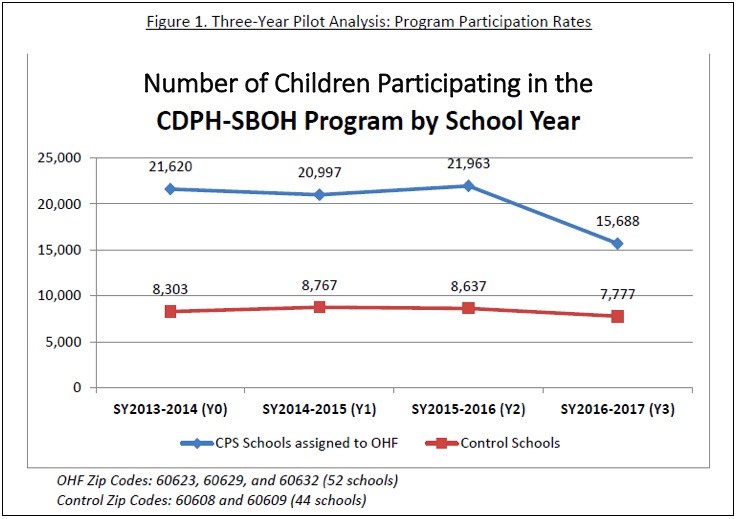This was originally posted on the Children's Dental Health Project's blog: www.cdhp.org/blog.
We should all be able to care for our children’s oral health regardless of our immigration status. But today, U.S. immigration policies are blocking many immigrant families from getting their children needed dental care. This is the reality facing Jazmin, a 26-year-old mom of four living on the south side of Chicago. Coming from Mexico with her parents when she was 11 years old (as undocumented immigrants), Jazmin is one of 800,000 young adults known as “Dreamers.”
Many Dreamers have been temporarily shielded from deportation and authorized to study or work in the U.S. under the Deferred Action for Childhood Arrivals (DACA) program. With a DACA work permit, Jazmin does her best to provide for her family. She takes only one day off each week from her minimum wage job. Jazmin also strives to keep her children healthy. Her four kids have been enrolled in Medicaid and the Chicago Department of Public Health’s School-Based Oral Health Program that works in collaboration with one of our organizations, the Heartland Alliance Oral Health Forum (OHF). But Jazmin has scaled back her use of public services and has withdrawn her children from the oral health program. She feared that continuing to engage with any public program would increase her risk of deportation. Speaking to the Chicago Tribune earlier this year, she said, “I live with the fear that they will come and they will take me.”
"...this chilling effect is particularly harmful to immigrant families’ oral health given the myriad barriers to dental care they already experience."
There are hundreds of thousands of families like Jazmin’s. Immigrant communities from across the country have been retreating from medical, dental, and other social services for which they or their children were qualified and enrolled.
In Chicago, this chilling effect is particularly harmful to immigrant families’ oral health given the myriad barriers to dental care they already experience. OHF research has shown that three south Chicago neighborhoods, which are predominantly Mexican immigrant communities, bear the brunt of the city’s oral health disparities. They face a variety of obstacles, including a lack of nearby dental clinics, language barriers, and a shortage of providers who accept individuals enrolled in Medicaid.
OHF’s program was designed to help families overcome these barriers, providing students with oral health education, free preventive dental services, in-depth case management, and outreach to ensure students get the oral health care they need.

But a preliminary analysis of participant data, for which publication is forthcoming, revealed a real-life example of this chilling effect. It found that, among children living in these three neighborhoods, program participation fell by 25% in the 2016-2017 academic year as compared to other neighborhoods in the city.
Many federal immigration actions are fueling this culture of fear and withdrawal from key health programs:
- Uncertainty surrounding DACA.The Trump administration ended DACA in September 2017. It has since been the subject of evolving federal litigation. Like many Dreamers, Jazmin is uncertain if she will be able to renew her DACA work permit that expires in December. As Congressional action stalls and the DACA remains unsettled, Dreamers are increasingly losing protection.
- Increased enforcement of deportation. The administration has been pursuing more robust enforcement activities, further heightening concern among immigrant communities about family separation, job security, and access to medical and dental care.
- Anticipated “public charge” proposal. Earlier this year, news reports surfaced about White House plans to make it more difficult for immigrants to settle in the U.S. if they might use public programs. The U.S. Department of Homeland Security confers a “public charge” status to individuals they deem likely to primarily rely on public services. Someone with this status could be denied entry to the US, a green card, and sometimes, face deportation. The administration is expected to soon propose changes to broaden the array of services considered in public charge determinations – including Medicaid and the Children’s Health Insurance Program, which are important for children’s access to dental coverage.
- Targeting immigrant families via the US Census. US Secretary of Commerce Wilbur Ross, whose oversees the US Census Bureau, approved a new question for the 2020 Census tied to citizenship status. This question is likely to scare immigrant families from participating in the census for fear of revealing their immigration status or that of loved ones. Inaccurate data resulting from the survey would threaten significant federal funds that go to states for health programs such as Medicaid and CHIP, since money is calculated using census information.
Based on our conversations, outreach, and data that continues to emerge, it is clear that these actions have further elevated toxic stress in immigrant communities. They are generating distrust in existing health care systems and causing families to withdraw from critical health services. For children, the constant threat of a parent’s deportation also has profound effects, placing their mental health and development at risk.
Jazmin, while she remains fearful, allowed the Oral Health Forum to assist her with her children’s dental needs. OHF reassured her that her personal information was safe. Thankfully, her kids have reentered the school-based oral health program and are getting their dental needs met. We admire Jazmin’s courage to share her story with us and the media.
We want to every child and family to be able to stay healthy. Whether you’re an individual advocate or a fellow organization, please join us in pushing back against efforts that are harming the health of immigrant communities. See this resource page for how you can get involved.
This piece was coauthored by Dr. Alejandra Valencia and Alberto A. González. Dr. Alejandra Valencia is Director of the Oral Health Forum, a program that works to create more equitable solutions to improve access to quality oral health services for ALL Chicago residents.
